Past research studies
The following studies are no longer recruiting participants. To find our more about the results of these studies contact the researchers directly.
Help Us Explore the Impact of Social Support on Arthritis Management
The University of Cumbria UK is conducting a research project investigating the impact of social support from friends and family on the exercise management of individuals with arthritis.
The study aims to explore how social support influences adherence to exercise programs and overall arthritis management. By shedding light on this relationship, the findings could contribute to developing more effective, patient-centered strategies to improve arthritis care and outcomes.
For more information click on the link below.
To complete the online survey click on the below.
Examining the Impact of Social Support and Exercise on Arthritis Management: A Quantitative Study
Rheumatoid Arthritis MRFF grant application
We’re seeking 2-3 rheumatoid arthritis patients to help develop an (Medical Research Future Fund) MRFF grant application. Ideally you will have recent onset RA (in the last 10 years) and have had previous experience on a research or clinical guidelines project, or a relevant qualification in health or science.
Involvement includes three one-hour meetings pre-submission and will be remunerated. A consumer with relevant skills may be considered as a grant investigator. Further involvement is possible if the grant succeeds.
The research will compare two methotrexate treatment approaches for newly diagnosed rheumatoid arthritis patients. The 12-month study will assess disease activity, side effects, and long-term impacts to determine if higher initial doses improve outcomes compared to conventional treatment.
To find out more and register your interest, please email info@arthritisaustralia.com.au with some information about your relevant skills and experience.
An opportunity to be involved in shaping shoulder osteoarthritis research.
Do you want to improve the lives of people with shoulder osteoarthritis? Would you like to make a difference by helping prioritise research about the condition? Are you someone with shoulder osteoarthritis or a relative or close friend caring for or supporting someone with the condition?
The SOAR Project seeks to identify the top 10 research priorities for shoulder osteoarthritis. We’re recruiting two people with shoulder OA and one carer to join our Steering Group, which will meet online 9 times over 18 months. Members will also spend about an hour between meetings on project-related tasks.
We encourage applications from diverse backgrounds, especially Aboriginal and Torres Strait Islander people. Communication skills and connections to shoulder OA networks are valuable. Experience with research involvement is preferred, and online meeting capability is required. Consumer support and training are available.
Participants will be compensated at $50 per hour for approximately 18-23 hours of involvement over the project duration.
For more information and to check eligibility click on the link below or contact Dr Jonathan Quicke on j.quicke@uq.edu.au
Opportunity to join the Australian Orthopaedic Association committees as a consumer representative
The Australian Orthopaedic Association (AOA), the peak professional organisation for orthopaedic surgery in Australia, is keen to increase its involvement with patients/consumers, and is currently seeking expressions of interest for consumer representative positions on several committees, including the AOA Registry Committee, Federal Training Committee, Research Academy, and the Advocacy Committee.
The commitment would involve attending three to four meetings a year, generally in the evenings for around 90 minutes from 7.30pm Eastern Time, with about an hour’s pre reading per meeting.
In addition to your lived experience of arthritis or a musculoskeletal condition and experience of orthopaedic care, these roles would suit consumer representatives who have sat on committees or boards before and have skills or experience in at least one of the following:
· health and medical research
· education and training
· advocacy or communications
To find out more and register your interest, please email info@arthritisaustralia.com.au with some information about your lived experience and other relevant skills and experience.
Research priorities to reduce the individual and societal burden of osteoarthritis in Australia
You are invited to participate in a research project being conducted at The Centre for Health, Exercise and Sports Medicine at The University of Melbourne.
”What future research on osteoarthritis do you think is most needed?”
For more information and to check eligibility click on the link below.
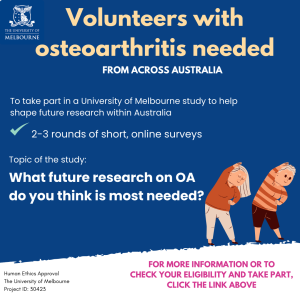
Deprescribing Opioids - registered healthcare professionals survey
A research team from The University of Sydney is conducting a study about the resource needs and support registered healthcare professionals require to deprescribe (reduce) opioid analgesics at transitions of care (the movement between different care settings or providers).
You must be currently practicing in Australia to participate and the research involves the completion of a short survey which will take up to 15 minutes.
Further information and the survey links are below.
Still feeling the ache after your total knee replacement?
Researchers at The University of Sydney are interviewing patients to learn about their experience of persistent pain following total knee replacement.
In Australia, 70,000 Total Knee Replacements (TKR) are performed every year. While TKR improves overall pain and function, 1 in 4 patients experience persistent pain after TKR.
Led by University of Sydney and University of New South Wales researchers are developing a model of care for people who have persistent pain after knee replacement surgery – the EPIK model of care. EPIK will identify and treat patients, primarily via telehealth for scalability and accessibility across Australia.
For more information click on the links below-
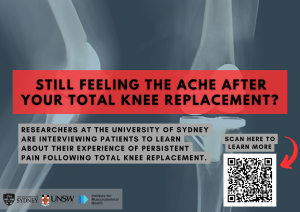
Gout Clinical Trial
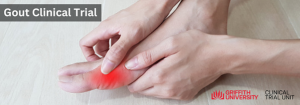
Why is this study being conducted?
Gout is caused by a high level of uric acid in the blood, which builds up over time. Uric acid is produced when the body digests foods that contain a high level of a chemical called purine; purines can be found in certain types of meat, seafood, and alcohol. Normally, this uric acid is then passed through the urine. However, in people with gout, uric acid is not eliminated correctly and builds up in joints, causing very small crystals of uric acid to form; these are called urate crystals. When urate crystals dissolve, this can trigger a painful gout flare-up.
Many of the current approved treatments for gout are called urate-lowering therapies (ULTs). These are designed to lower the uric acid levels in blood. However, due to how these treatments work in the body, they can disturb the urate crystals in joints, leading to a gout flare-up.
Who is eligible to participate in this study?
You may be able to take part in the Gout Clinical Trial if you:
Are aged between 18 and 85 years
Have high uric acid levels in blood
Have gout or a history of gout
Additional eligibility criteria may apply and will be discussed directly with the Clinical Trial Coordinator.
What happens during the study?
The study will last up to 14 months. During the study, you will be required to:
Attend regular up to 17 study centre visits for health checks
Take your assigned study drug daily and receive additional medications to prevent gout flare-ups
Fill out an electronic diary each day to record any gout flare-ups
Participation in this study is completely voluntary, and participants can decide to withdraw at any time.
Eligible participants will be reimbursed for travel, parking, meals and other expenses associated with each study visit.
Register for this clinical trial https://redcap.link/gout
For further information please contact Taryn Houghton, Clinical Trial Coordinator on 0479178535 or email: clinicaltrialunit@griffith.edu.au
Ethics approval number for the Gout Clinical Trial: Bellberry Limited 2022-10-1070-AC, GU HREC 2023/353
myPATH- Pain Research Program (aged 16 - 24 years)
Help develop a digital solution to support other young people to manage their pain…
Researchers at Curtin University are inviting young people (aged 16 – 24 years) with chronic musculoskeletal pain to share what they would value from a digital coach to support their pain care.
Complete an online survey to measure your preferences for different versions of a digital coach and be entered into a prize draw to win 1 of 5 gift cards
Visit https://bit.ly/myPATHsurvey to find out more and sign up
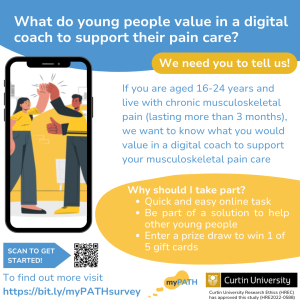
Is knee osteoarthritis keeping you from living your best life?
We are looking for people living with knee osteoarthritis to join our new clinical trial. The trial is testing a foaming topical treatment to see if it improves knee pain. Participation in the study lasts for approximately 5 weeks. All study-related medical care is provided at no cost to you, and you will be reimbursed for your expenses related to your participation in the study.
Please complete the questions via the link below to find out if you may be eligible for this study. If you are eligible, we will contact you via phone and give you the full study information. If you have any questions, please call us on (02) 4985 1860.
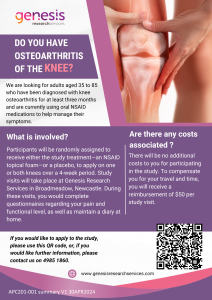
Knee Osteoarthritis Clinical Trial Survey (research.net)
Chronic Pain Survey
Griffith University is conducting a research project aimed at better understanding the relationship between the home environment and chronic pain. If you are an adult living with chronic pain in Australia, we want to hear your voice.
Click on the link or QR code below to learn more and participate.
https://redcap.link/GriffithChronicPainSurvey
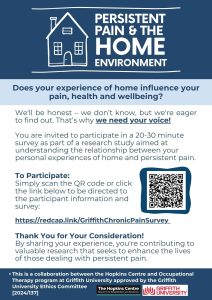
.
The Efficacy of Shoe Inserts for Midfoot Osteoarthritis: A randomised controlled trial
The Efficacy of Shoe Inserts for Midfoot Osteoarthritis: A randomised controlled trial
What is the study about?
This study is about non-surgical treatments for midfoot osteoarthritis. There has been little research to evaluate which treatments are helpful for people with midfoot osteoarthritis. We hope to learn if shoe inserts, combined with clinical guideline-based care information and support, are effective for treatment of osteoarthritis in the midfoot joints. There will be 140 people who will be part of this study.
To find out more and register your interest, please visit our website here: https://redcap.link/MidfootOsteoarthritisTrial
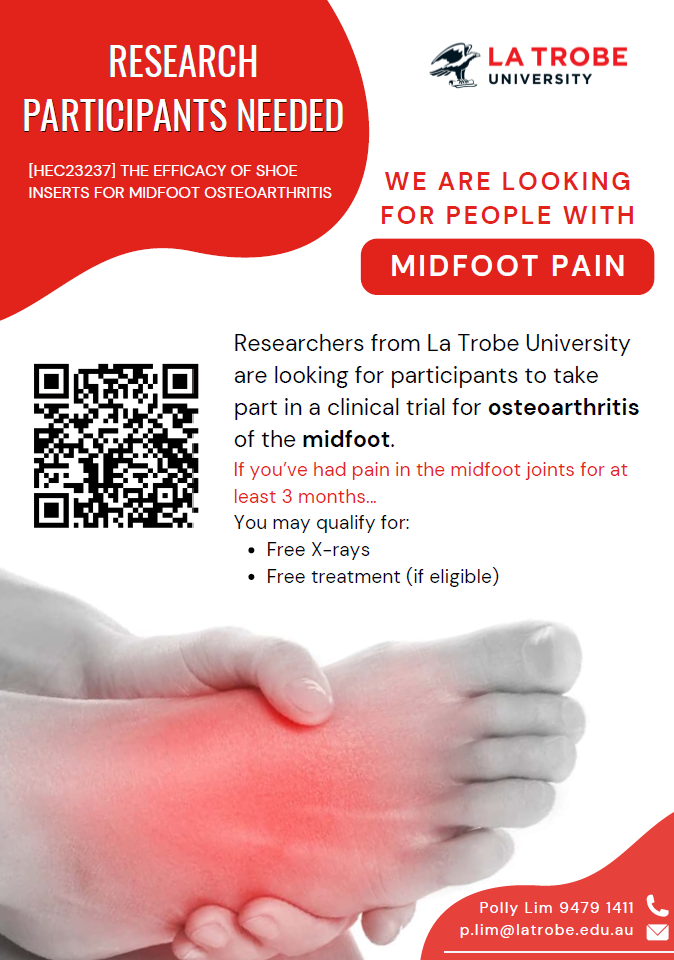
Pain Medicines after total Hip or Knee Replacement
Pain medicines after total hip or knee replacement
We are interested in understanding what people are considering when deciding what to ask for pain medicine when are they discharged from hospital after a total hip or knee replacement.
Who are we looking for?
We would like to engage with men currently scheduled for or on the waiting list for a total hip or knee replacement surgery.
What will you need to do?
Complete a brief online survey asking for your consent to join the study and to collect some basic details about you.
One video or telephone interview (20min to 1 hour) at a time convenient to you (with the possibility of a request for a follow up interview, which you are not obliged to accept).
Link to the survey: https://redcap.sydney.edu.au/surveys/?s=PACCHJMHPY3L7HLX
Contact us
Email us at caitlin.jones@sydney.edu.au if you have any questions or if you would like a copy of the participation statement.
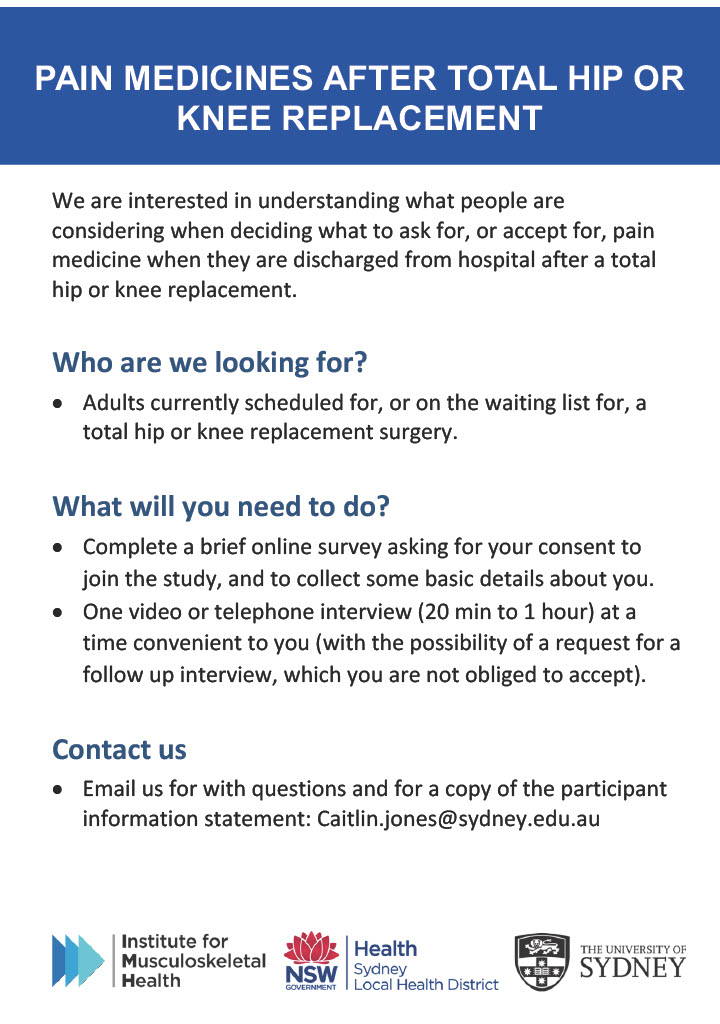
Have you had Low Back Pain?
Have you had low back pain?
We are developing a way to measure low back pain burden and improve care for people with low back pain at Monash Univeristy
To participate in this survey, please scan the QR code below or follow this link: https://tinyurl.com/BackSurveyRound2
For more information, please contact: bayden.mckenzie@monash.edu
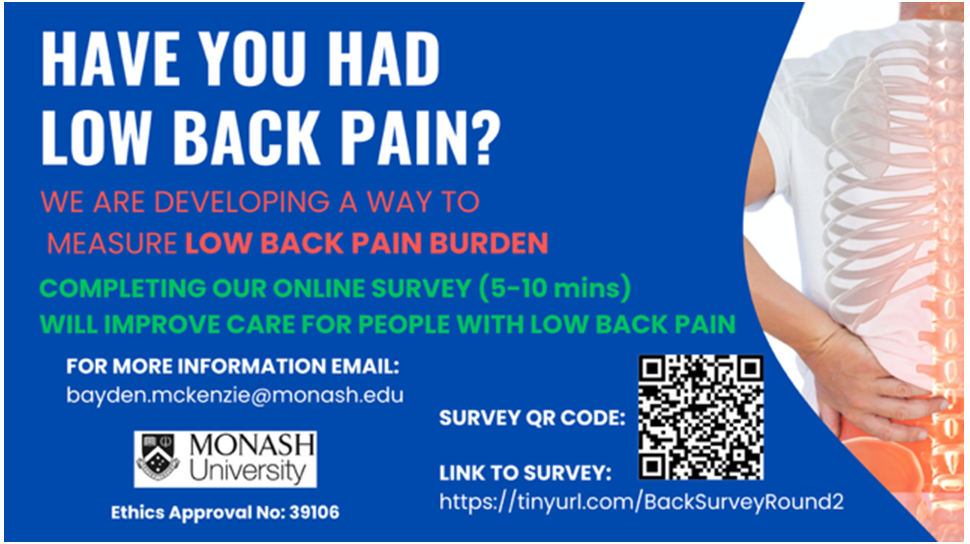
Do you have Gout or care for someone with Gout?
Do you have Gout or care for someone with Gout?
The Health Care Consumers’ Association, in partnership with Arthritis Australia and others, are doing some research around how we can help you and others living with gout. Your experiences and opinions could make a difference for others.
If you are an adult (18+ years) and:
- living with gout, or
- carers of people living with gout
We want to talk to you! Please contact the Health Care Consumers’ Association on:
- Phone: (02) 6280 7800
- Email: adminofficer@hcca.org.au
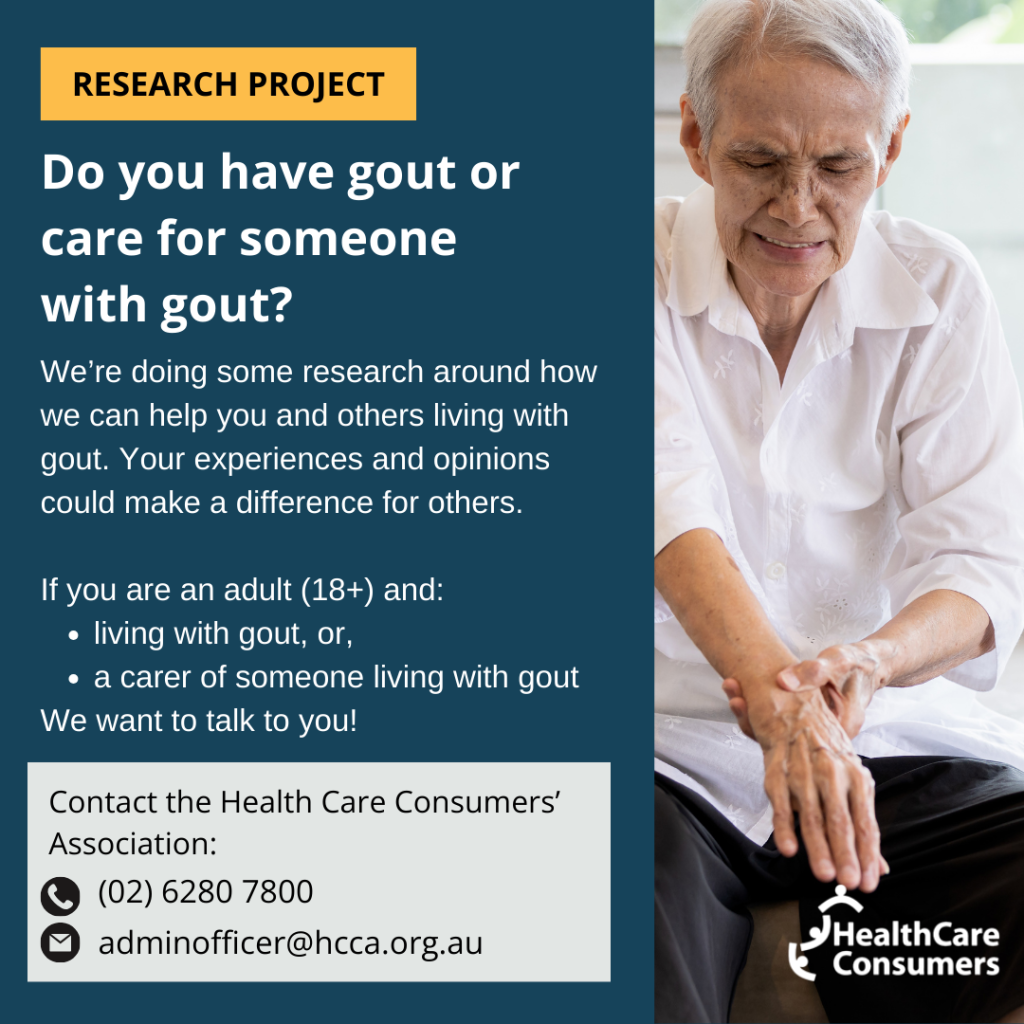
Have you had Frozen Shoulder or currently living with it?
Have you had Frozen Shoulder or currently living with it?
🗣 Join us and share your voice
We are looking for people who have recovered from frozen shoulder or currently living with frozen shoulder to share their experiences of living with this condition and how it impacted their lives.
The results will be shared with healthcare professionals to enhance their understanding of frozen shoulder, and to help develop patient-center strategies to enhance the current management of frozen shoulder in Australia.
WE NEED YOUR INPUT! Your time will be reimbursed.
Please contact Ms Rong Wang via rongw@our.ecu.edu.au for more information.
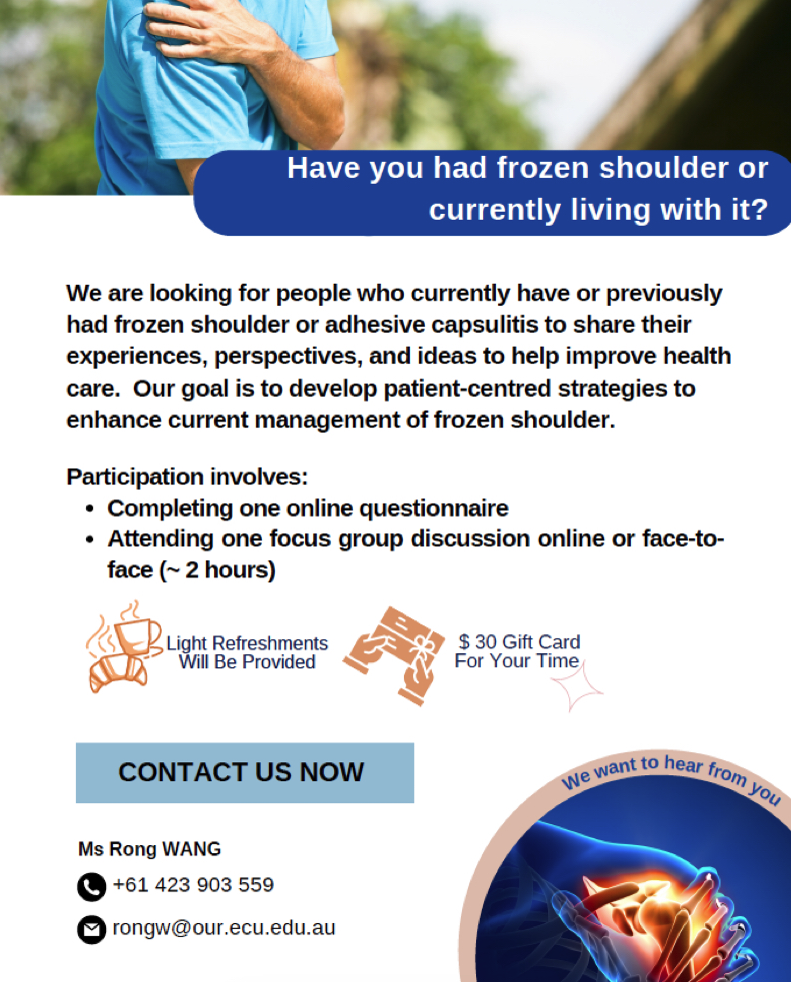
Have you had Low Back Pain? A modified Delphi Study by Monash University
Have you had Low Back Pain?
We are seeking consumer participants to complete our survey to develop a core set of low back pain measurements (or ‘indicators’) that could be used to monitor progress in improving care and outcomes for people with low back pain in all countries.
This work is being conducted in collaboration with Professors Rachelle Buchbinder, Chris Maher, Dr Romi Haas, and Giovanni Ferreira.
We are asking participants to complete up to three survey rounds, each taking approximately 10-15 minutes. The first survey will ask participants to rate the importance and feasibility of 38 potential low back pain indicators and add any further indicators that may be appropriate. After viewing the summarised results from Round 1, a second survey (and third survey if consensus is still required) will be used to establish consensus on the most important and feasible indicators.
Participants will have up to 4 weeks to complete the first survey. This research has been approved by Monash University’s Human Research Ethics Committee (Approval no.: 39106).
If you have any questions, please feel free to contact: bayden.mckenzie@monash.edu
To participate in this survey, please follow this link: https://tinyurl.com/backsurvey23
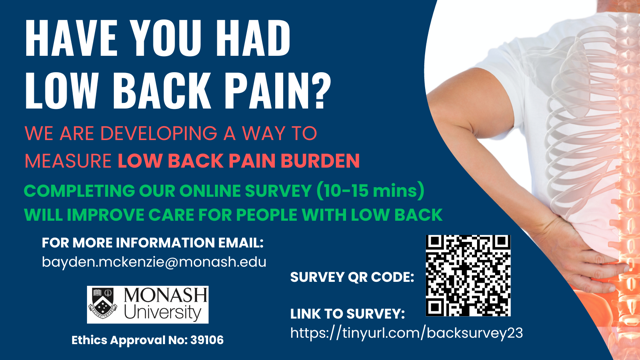
Osteoarthritis care in Australian community pharmacies: How can pharmacists contribute?
Osteoarthritis care in Australian community pharmacies: How can pharmacists contribute?
We would like to hear your opinions and ideas about osteoarthritis management in community pharmacy, this survey will include:
Demographics
We would like to know more about you and the pharmacy you work in the most.
Motivation
We would like to know if osteoarthritis is an area you would like to more involved in.
Care standards
We would like to ask where pharmacists may be able to contribute on the 5 out of 7 clinical care standards on osteoarthritis, proposed by the Australian commission in quality and safety in healthcare.
Clinical skills and knowledge
We would like to know more about your skills and knowledge when it comes to osteoarthritis.
Barriers and non-pharmacist staff
What barriers could you come across when offering osteoarthritis care and where do non-pharmacist staff fit in the picture of OA care.
This survey will take about 15 minutes to complete, you will also have an opportunity to win 1 out of 5 gift cards, if you leave your details after completing the survey.
If you would like to participate in this survey, please click onto this link: https://curtin.au1.qualtrics.com/jfe/form/SV_9ZfB8pGrggk3odo

Do you have a diagnosis of Fibromyalgia?
o you have a diagnosis of Fibromyalgia?
We are studying the way that pain influences decision making and we need your help! Participation involves completing a single-session study at the University of South Australia that will take approximately 2-2.5 hours.
Who can participate?
People who have fibromyalgia and individuals who do not currently experience pain.
People that have health conditions that prevent safe participation in physical activity (e.g., severe heart or lung disease, uncontrolled diabetes) will not be eligible to participate. Additionally, people with intellectual disabilities or cognitive impairment, those with diagnosed mental health conditions, or those with other injuries/pain conditions that will limit their ability to perform the tasks will not be eligible to participate. Only medication-free individuals or those with consistent medication use (stable for at least the past month) will be able to take part. Last, people who are not fluent in English and younger than 18 years old will not be able to participate.
What will I have to do?
Following the online pre-screen for eligibility, the study involves a single behavioural session held at UniSA. We anticipate the session will take approximately 2-2.5 hours to complete. If you decide to take part in the study, you will be asked to provide certain information about yourself including: demographics, information about personality (trait impulsivity), perception of bodily sensations and state (mood state), details of your current treatment and diagnosis. Additionally, you will be asked to complete several tasks indicating your preferences for smaller immediate/effortless gains (raffle tickets) versus larger but delayed/effortful ones. The tasks involving effort will include doing a memory task (cognitive effort) or walking on a treadmill (physical effort). We will also measure how well you can feel your own heartbeat. To record your heartbeat, we will attach two recording electrodes to your chest. Although this procedure is straightforward, to facilitate the attachment of the electrodes please wear loose top on the day of the experiment.
We will also provide you with a wrist-worn activity tracker and ask you to wear it for one week (7 days) following the study. You can then return the device to us in a prepaid return envelope. We will reimburse you $40 for your time in the behavioural session. Additionally, you will be entered into a raffle for an extra prize: The more raffle tickets you collect in the tasks described above, the more likely you will be to win the prize. The raffle will be resolved at the end of the study (when we collect data from all participants) and the prizes will be sent by email.
For more details and to complete the eligibility survey, please see: https://unisasurveys.qualtrics.com/jfe/form/SV_aaQjSUoAPZ0gbD8
Consumers in Basic Science Research Project
Consumers in Basic Science Research Project
This research project aims to explore consumer involvement in pre-clinical research (research before testing the interventions in people), specifically in the field of musculoskeletal conditions. Consumers, such as people with lived-experience of a musculoskeletal condition and their carers are invited to participate by completing an anonymous online questionnaire. The findings of this study will help understand the current level of consumer involvement and identify opportunities to increase their participation in research.
If you would like to participate in this research, please click on the link below:
https://uniofqueensland.syd1.qualtrics.com/jfe/form/SV_0d0xIWpPgxUZfsW
Consumers in Basic Science Research Project
Consumers in Basic Science Research Project
This research project aims to explore consumer involvement in pre-clinical research (research before testing the interventions in people), specifically in the field of musculoskeletal conditions. Consumers, such as people with lived-experience of a musculoskeletal condition and their carers are invited to participate by completing an anonymous online questionnaire. The findings of this study will help understand the current level of consumer involvement and identify opportunities to increase their participation in research.
If you would like to participate in this research, please click on the link below:
https://uniofqueensland.syd1.qualtrics.com/jfe/form/SV_0d0xIWpPgxUZfsW
A co-designed Heart Health Resource for midlife women promoting Healthy Lifestyles and Reducing Heart Disease Risk
A co-designed Heart Health Resource for midlife women promoting Healthy Lifestyles and Reducing Heart Disease Risk
This is an online survey by the Ask Heart Health project at Monash Centre for Health Research and Implementation. The aim of this survey is to understand what you need to know about heart health and what might support you in promoting better care of your heart health. Heart disease is a major cause of health problems in Australia.
We invite women aged 45 to 60 to do our online survey. The survey will take about 20 minutes and you don’t have to give your name or other personal details. Participating in the survey is voluntary and you can stop at any time if you choose not to continue. By doing the survey you consent to the information being used to create better heart health information and tools for women like you. We want to guide women to do heart disease screening and promote healthy lifestyles during midlife.
Your valuable input will help us improve the health of women across the country.
This research has been approved by the Monash University Human Research Ethics Committee.
If you have any questions or interested in taking part in an individual online interview to explore in more detail about what women want to help manage their heart health AND/OR later help us to test the app produced from the results of this survey and research project, please email us at: askhearthealth@monash.edu
To participate in this survey, please click here: https://monash.az1.qualtrics.com/jfe/form/SV_42asmEDqzKCEBHE
Thank you for considering to participate in this survey!

Help us to co-design better care for Adolescents with Chronic Pain
elp us to co-design better care for Adolescents with Chronic Pain
Are you an adolescent (12 to 19 years) or a parent or carer of an adolescent with chronic pain (pain that has been persistent or recurred frequently for 3 months or more) who live in South Australia?
Have you sought healthcare for the pain? We would like to find out about your experiences:
the good, the bad and the ideal.
You can contribute by joining our Youth Advisory Group, our Parent/Carer Advisory group (2 meetings Sept and Nov for 90 mins each time) or by having a one-on-one interview.
We offer a $50 gift card in remuneration for your time (per meeting or per interview).
To express interest or find out more, please:
Scan the QR code (use your phone camera)

Or follow the link: https://redcap.link/EOIYouthPainProject
Contact Dr Carolyn Berryman (lead researcher) on 83022442 or
Carolyn.berryman@unisa.edu.au with any questions
The Development of an Educational Resource for people with Bunions
The development of an educational resource for people with bunions
What is the study about?
You are invited to participate in a study which is designed to develop a patient information leaflet for people with hallux valgus (also known as a bunion). We hope to learn about your beliefs and expectations about what a patient information leaflet should include for people with this condition.
Your contact details were obtained from a database of people who have been attending the La Trobe University Podiatry Clinic for foot-related treatment or you might have responded to an advertisement posted at La Trobe University or of the clinic of a health professional.
Do I have to participate?
Being part of this study is voluntary. If you want to be part of the study we ask that you read the information below carefully and ask us any questions.
You can read the information below and decide at the end if you do not want to participate. If you decide not to participate this won’t affect your relationship with La Trobe University or any other listed organisation.
Who is being asked to participate?
You have been asked to participate because:
- You are over the age of 18 and have had a painful hallux valgus for the past 3 months, or
- You are a health professional that currently manages people with hallux valgus
What will I be asked to do?
If you want to take part in this study, you will be asked to attend two focus groups. The first focus group will involve talking about your preferences for the content and design of a patient information leaflet for people with hallux valgus. The second focus group will involve providing feedback on a leaflet that was designed based on your input from the first focus group.
Each focus group will take approximately 60 minutes to complete.
| Example procedures |
Assessment/task |
Online Screening
Time: 5 minutes |
Focus Group One
Time: 60 minutes |
Focus Group Two (four weeks after Focus Group One)
Time: 60 minutes |
| Eligibility | X | X | X |
Observational notes and audio recordings will be collected from the focus groups.
What are the benefits?
All participants will be provided with a $50 shopping voucher for their participation in the study. In addition, information gathered by participants in this study will be used to guide and develop a patient information sheet for people with hallux valgus. It is envisaged that this resource will help people with hallux valgus to make mor informed decisions about the treatment of hallux valgus as well as supporting clinicians who manage this condition.
What are the risks?
With any study there are (1) risks we know about, (2) risks we don’t know about and (3) risks we don’t expect. If you experience something that you aren’t sure about, please contact us immediately so we can discuss the best way to manage your concerns.
| Name/Organisation | Position | Telephone | |
| Dr Matthew Cotchett | Chief Investigator | 5444 7213 | m.cotchett@latrobe.edu.au |
We do not foresee any risks associated with this study.
What will happen to information about me?
We will collect information about you in ways that will reveal who you are
We will store information about you in ways that will not reveal who you are.
We will publish information about you in ways that will not be identified in any type of publication from this study.
We will keep your information for 7 years after the project is completed. After this time we will destroy all of your data.
The storage, transfer and destruction of your data will be undertaken in accordance with the Research Data Management Policy https://policies.latrobe.edu.au/document/view.php?id=106/.
The personal information you provide will be handled in accordance with applicable privacy laws, any health information collected will be handled in accordance with the Health Records Act 2001 (Vic). Subject to any exceptions in relevant laws, you have the right to access and correct your personal information by contacting the research team.
Will I hear about the results of the study?
We will let you know about the results of the study on request. This may entail mailing a summary of the results (which will not be identifiable) to your home residence. If you prefer, a discussion with Dr Matthew Cotchett can occur in person”.
What if I change my mind?
You can choose to no longer be part of the study at any time until [four weeks] following the collection of your data. You can let us know by:
- Completing the ‘Withdrawal of Consent Form’ (provided at the end of this document);
- Calling us; or
- Emailing us
Your decision to withdraw at any point will not affect your relationship with La Trobe University or any other organisation listed.
When you withdraw we will stop asking you for information. Any identifiable information about you will be withdrawn from the research study. However, once the results have been analysed we can only withdraw information, such as your name and contact details. If results haven’t been analysed you can choose if we use those results or not.
Who can I contact for questions or want more information?
If you would like to speak to us, please use the contact details below:
| Name/Organisation | Position | Telephone | |
| Dr Matthew Cotchett | Chief Investigator | 5444 7213 | m.cotchett@latrobe.edu.au |
What if I have a complaint?
If you have a complaint about any part of this study, please contact:
| Ethics Reference Number | Position | Telephone | |
| HEC22353 | Senior Research Ethics Officer | +61 3 9479 1443 | humanethics@latrobe.edu.au |
If you would like to participate this study please fill out the below consent form:
How Individuals with Physical Impairments manage their self-reported Eczema
How Individuals with Physical Impairments manage their self-reported Eczema
How is the study being paid for?
This project has no funding and is supported by Western Sydney University School of Health Sciences.
What will I be asked to do?
Those who agree to participate will be asked to attend one 60-minute interview either online or in person at a location of your choice to share your experiences in managing your eczema. Questions in the interview will cover topics around how you manage your eczema currently, what things at present and in the past have made it more difficult for you to manage your eczema effectively, and what things have made it easier for you to manage your eczema.
How much of my time will I need to give?
The interview will last around 60 minutes. Researchers may contact you one additional time via email or phone if they need to ask you to clarify or expand on any statements you make during the interview.
What benefits will I, and/or the broader community, receive for participating?
There are no direct benefits to you for participating in this research. However possible future benefits include that they study may provide more information on how individuals with physical impairments manage eczema. This may help stakeholders support individuals with physical impairments manage their skin condition and improve their quality of life. Participation in this study is voluntary.
Will the study involve any risk or discomfort for me? If so, what will be done to rectify it?
We do not anticipate that the interviews will cause distress for participants, however in an unlikely event that interviews trigger an awareness of any ‘negative health consequences’ associated with eczema the researcher will advise the participant to make an appointment to discuss their concerns with their General Practitioner or health care provider. The participants will be provided with appropriate information for example as below:
Lifeline (call 13 11 14) https://www.lifeline.org.au
The Beyond Blue Support Service (call 1300 22 46 36)
https://www.beyondblue.org.au/get-support
Mindspot (call 1800 61 44 34) https://www.mindspot.org.au
How do you intend to publish or disseminate the results?
It is anticipated that the results of this research project will be published and/or presented in a variety of forums. In any publication and/or presentation, information will be provided in such a way that the participant cannot be identified, except with your permission. Interview data will be re-identifiable to the research team member conducting the Interview but not the research team and will not be re-identifiable in any publication. Interviews will be non-identifiable. Pseudonyms will be used for re-identifiable information to ensure identity is protected at each stage of data analysis and reporting. All information will be coded and stored on a password protected computer or on the University’s OneDrive system. While we will store de-identified data on the university data repository site, we do not anticipate any future use on this set of data.
Will the data and information that I have provided be disposed of?
Please be assured that only the researchers will have access to the raw data you provide. However, your data may be used in other related projects for an extended period of time. The data will be stored in a secure and de-identified format in the research team passcode protected one drive folder and on the University data repository. All data will be destroyed five years post publication as per data storage policy. Only to the extent that data from this study that are published in the report or published in a journal will be referred to in future research. Data collected during this project will be used for the purposes of this project only and will not be made available to other parties in the future. Western Sydney University will share ownership of the information resulting from this research. All data and participant information will remain at Western Sydney University.
Can I withdraw from the study?
Participation is entirely voluntary and you are not obliged to be involved. If you do participate you can withdraw at any time without giving reason.
If you do choose to withdraw, any information that you have supplied will be withdrawn from analysis and destroyed.
Can I tell other people about the study?
Yes, you can tell other people about the study by providing them with the researcher’s contact details. They may contact the researcher to discuss their participation in the research project and obtain a copy of the information sheet. You can share the flyer with invitation to this project by sending the link to other people.
What if I require further information?
Please contact Paulina should you wish to discuss the research further before deciding whether or not to participate
Paulina Muszynski
Email: 20588827@student.westernsydney.edu.au
What if I have a complaint?
If you have any complaints or reservations about the ethical conduct of this research, you may contact the Ethics Committee through Research Engagement, Development and Innovation (REDI) on Tel +61 2 4736 0229 or email humanethics@westernsydney.edu.au.
Any issues you raise will be treated in confidence and investigated fully, and you will be informed of the outcome.
If you agree to participate in this study, you may be asked to sign the Participant Consent Form. The information sheet is for you to keep and the consent form is retained by the researcher/s.
This study has been approved by the Western Sydney University Human Research Ethics Committee. The Approval number is H15325
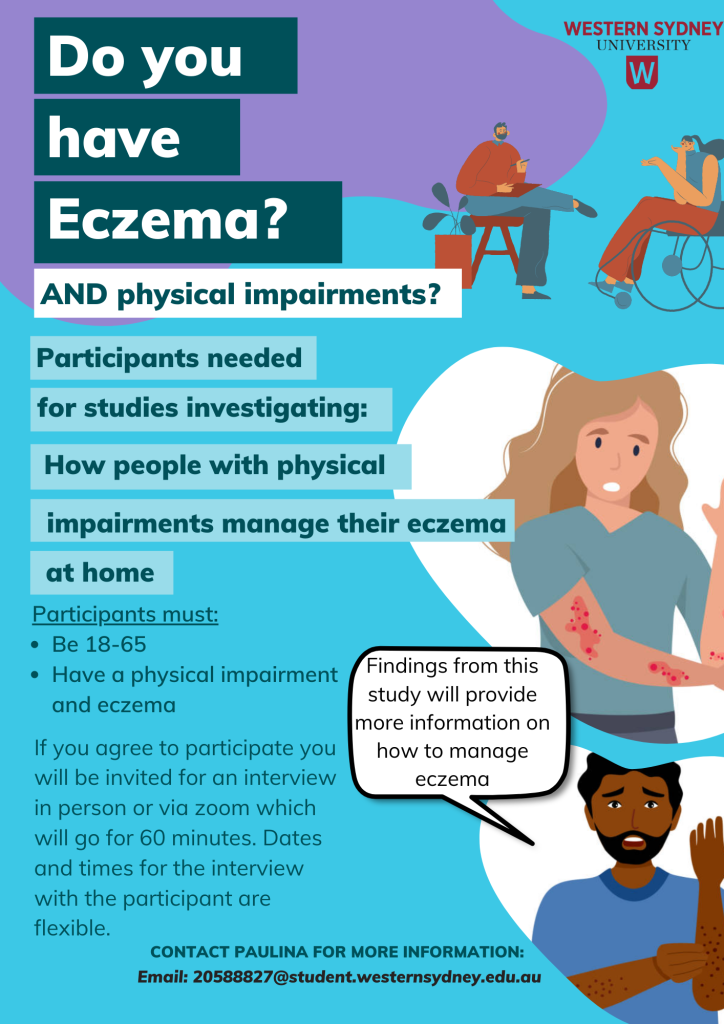
Are you suffering from Chronic Knee Pain and looking for a Solution?
HOPE4OA is a clinical trial for people suffering from moderate to severe knee pain due to osteoarthritis (OA). It aims to test the safety and effectiveness of an investigational medication for the treatment of pain and improvement of function in adult participants with osteoarthritis pain.
Am I eligible for this trial?
To check if you are eligible to take part in the HOPE4OA trial, answer a few simple questions on the website as per below:
www.hope4oa.com

Examining the Relationship between Health Literacy and Financial Distress in people with Arthritis
Examining the Relationship between Health Literacy and Financial Distress in people with Arthritis
Do you have arthritis, and have you ever wondered about the costs incurred across the lifespan? How might this relate to health literacy and knowledge? Monash University researchers are seeking your help with new research into these questions associated with living with arthritis. This research is funded by a research grant from Arthritis Australia.
We are conducting a short online survey (10-15 minutes) to understand people’s health literacy/knowledge, financial concerns, and general quality of life. The survey is anonymous.
This research has been approved by the Monash University Human Research Ethics Committee (Project ID 38560).
Please see below link to this survey:
https://monash.az1.qualtrics.com/jfe/form/SV_eQGDO7RdwPYaeai
For more information, please contact Dr Danielle Berkovic (Danielle.berkovic@monash.edu) at the School of Public Health and Preventive Medicine.

Establishing the smallest worthwhile effect of intra-articular Steroid Injections for Knee OA
Establishing the smallest worthwhile effect of intra-articular Steroid Injections for Knee OA
About this Research
All medical interventions involve benefits and risks – steroid injections are no exception. We want to hear from people experiencing knee osteoarthritis and understand how the expected benefits of a steroid injection are weighed against it’s risks. We want to hear from you!
For more information and questions before deciding if you want to participate in this research project, please do not hesitate to contact Clarence via email: clarence.yap@student.curtin.edu.au
How to Participate
Scan the QR code below which will direct you straight to the survey, fill out the consent form and read the participant information statement.
The survey will take 20 minutes.
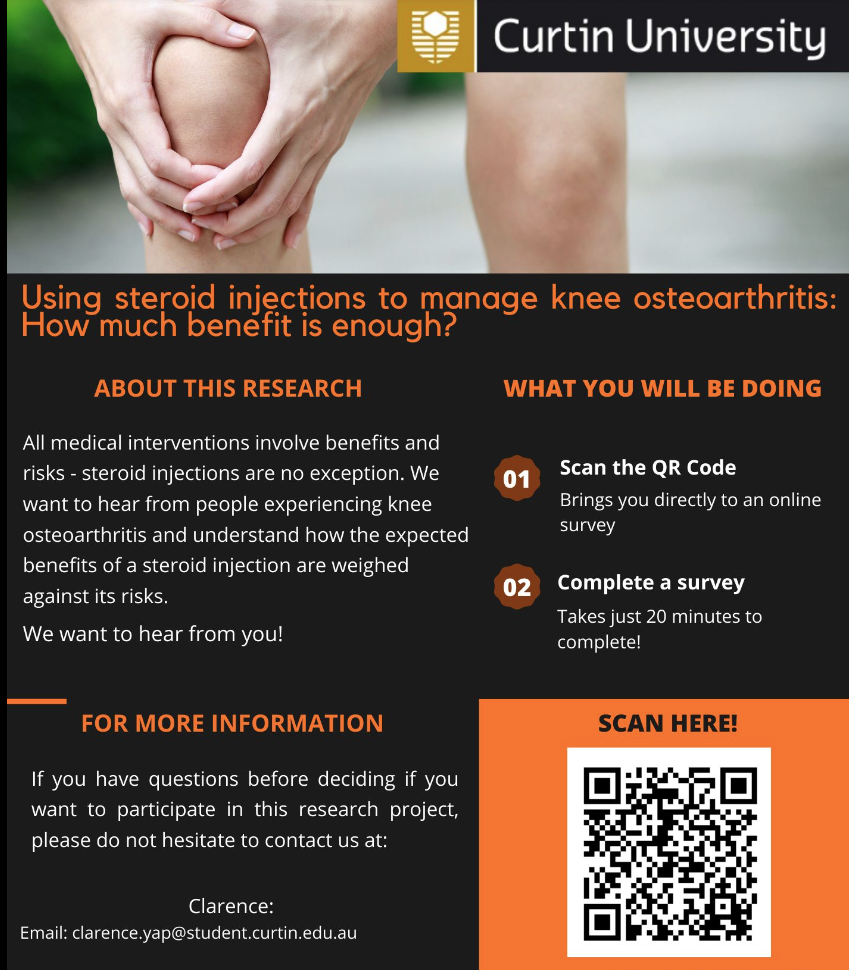
Community Based Research Project on Vasculitis
Community Based Research Project on Vasculitis
Vasculitis is a rare medical disease and often patients do not have access to the information they want to empower them to understand and manage their health. We want to know what information needs of Australian patients with vasculitis, their partners, carers, and families have unmet so that we can address this by creating purpose built materials that reflect real needs from real patients. Please take time to help by filling in this questionnaire.
You do not need to give your name, and your answers are strictly confidential.
https://survey.us.confirmit.com/wix/1/p267105709611.aspx
It only takes 10-15 minutes of your time to contribute your experience and make a difference in the quality of information available about vasculitis.
Development of Online Learning Modules to Increase Knowledge and Understanding of Frailty: Consumer Focus Groups
Development of Online Learning Modules to Increase Knowledge and Understanding of Frailty: Consumer Focus Groups
About the Project
Our research team is conducting a study that seeks to improve healthcare professionals’ and students’ knowledge and understanding of frailty in hospitals by developing online learning modules. Patient frailty is characterised by a decline of physical and cognitive reserves that leads to increased vulnerability. Frailty increases with age and is associated with falls, longer stays in hospital, difficulty recovering from illness and surgery, and mortality. Research shows that healthcare professionals need and want more training on frailty. To make sure that the modules are easy to use, inclusive, and helpful, we are designing them with a range of people including consumers, healthcare professionals, students, universities and consumer advocacy organisations.
The research team would like to invite older adults who have had experience using the hospital system to participate in this research. You will need to be 65 years or older (or 55 years or older if identifying as Aboriginal and/or Torres Strait Islander) and to have had exposure to hospitals, either as an outpatient or inpatient.
We are also seeking input from caregivers of older adults who have interacted with the hospital system. Caregivers need to be over 18 years old to participate. If you are a caregiver, you don’t have to participate with the person you provide care for, you can participate independently in this research.
Participation will take about 1 hour.
Participation in the study is entirely voluntary and participants will receive a $45 electronic gift card to thank them for their time.
To Participate in this study please follow the link: https://uniofqueensland.syd1.qualtrics.com/jfe/form/SV_3KO0sSJbMLFNy0m
For more information please email Dr. Kristiana Ludlow: k.ludlow@uq.edu.au
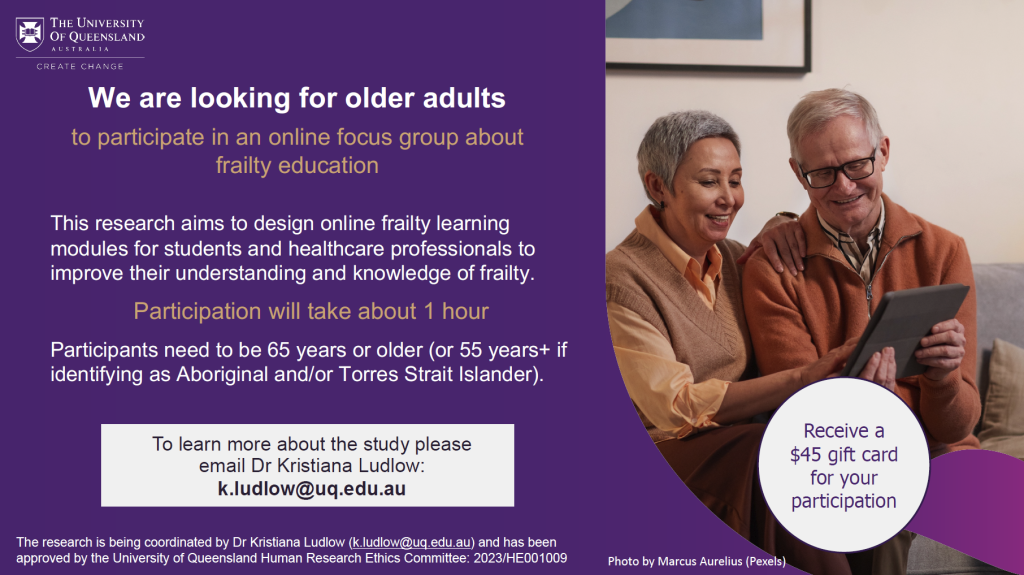
Are You 16-24 Years Living With Chronic Musculoskeletal Pain?
Are You 16-24 Years Living With Chronic Musculoskeletal Pain?
Researchers at Curtin University are exploring ways to support young people aged 16-24 years and experience pain that has persisted for more than 3 months, we would like to hear from you.
What’s involved?
You can be involved in:
- Individual interviews about your experience of persisting pain and your mental health wellbeing. This is will take approx. 60 minutes of your time.
- A group discussion and 3 rounds of survey’s about what care you prefer and value in digital health care. This will take approx. 90 minutes of your time in total.
Depending on your circumstances, you can be involved in one or both parts of this research. You will receive a gift voucher for participating.
To enroll in this study please click here: https://curtin.au1.qualtrics.com/jfe/form/SV_3JIBkpZ6Y4ya03I
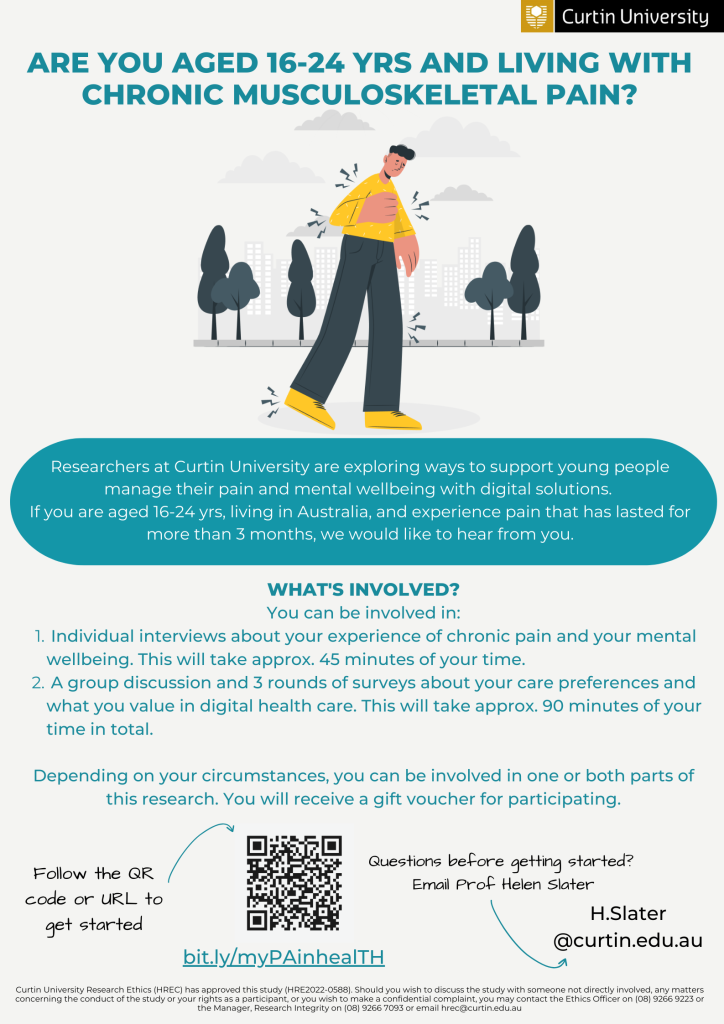
Assessing Barriers and Facilitators to Exercise-Based Rehabilitation for People with knee/hip osteoarthritis: A Survey Study
Assessing Barriers and Facilitators to Exercise-Based Rehabilitation for People with knee/hip osteoarthritis: A Survey Study
We are seeking volunteers to answer a survey regarding barriers and facilitators to exercise as a treatment for knee/hip osteoarthritis. If you have been diagnosed with knee/hip osteoarthritis by a doctor, are aged 18 years or older, and are living in Australia we want to hear from you.
Please complete the online survey about your experience with exercise related to your knee or hip osteoarthritis even if you feel you don’t exercise enough.
It should take about 20 minutes to complete the survey.
Access the link to help us to improve osteoarthritis treatment:
Study on Daily Physical Activity and Chronic Musculoskeletal Pain
Study on Daily Physical Activity and Chronic Musculoskeletal Pain
Do you have chronic low back pain, chronic neck pain, osteoarthritis, chronic shoulder pain, fibromyalgia, or chronic temporomandibular disorder? We are looking for you!
Our research team from REVAL Rehabilitation Research Center of Hasselt University (Belgium) is investigating the relationship between the intensity of daily physical activity and chronic musculoskeletal pain. Also, we aim to identify what makes it easier or harder for you to do physical activity, and what motivates you.
You can help us by filling in our online questionnaire through this link: https://uhasselt.qualtrics.com/jfe/form/SV_etl78e58y2YeUDQ
The questionnaire takes about 50 minutes to complete.
Cellular Horizons – Improving Decisions About Access to Stem Cell Interventions
Cellular Horizons – Improving Decisions About Access to Stem Cell Interventions
Have you had or thought about having stem cell treatment in Australia?
Do you care for someone who has?
Are you interested in sharing your views on access to these therapies?
As part of a research project, we are asking people about their experiences when considering stem cell or other cellular therapies. We are interested in:
- How people find out about stem cell or other cellular therapies?
- What makes people decide to have treatment or not?
- Who should determine access and under what circumstances?
This project is being undertaken by four universities across Australia and the National University of Singapore and is funded by the Australian Government through the Medical Research Future Fund Stem Cell Therapies Mission. Our partners include Arthritis Australia, Cerebral Palsy Alliance, MND Australia, MS Australia, Musculoskeletal Australia, and Parkinson’s Victoria. The project has received approval from Monash University Human Research Ethics Committee.
Please visit our website – www.monash.edu/arts/social-sciences/cellular-horizons to find out more about the project. You can also contact sian.supski@monash.edu who can answer any questions you may have. Interviews will take place with researchers over the phone or via Zoom (or your preferred online platform), will be confidential, and take approximately an hour. You will receive a $50 voucher in recognition of your contribution to the project.

The Impact of Chronic Pain on Daily Life
The Impact of Chronic Pain on Daily Life
Chronic pain affects ~25% of the adult population in the UK and there is an urgent need to develop safer and more effective medications to help those living with pain. A major hurdle in the development of new painkillers is poor translation of pain when tested in laboratory animals and human patients. We believe focusing on how pain affects the natural behaviour of mice may hold better value when testing novel medications. Measuring changes in natural behaviours, such as digging activity, also represent a refinement in the assessment of pain in lab animals. To determine how well such changes correlate with how humans experience pain we are running this study to better understand how chronic pain impacts the daily lives of adults.
Who can participate?
To be eligible to participate in this study you must be:
- 18 years or older
- Diagnosed with a health condition that causes chronic pain (regular bouts of pain for at least 3 months).
What will you have to do in this study?
You will be asked questions about health conditions which may cause you chronic pain, how you manage your pain and how the pain that you experience impacts your day-to-day life. All data gathered will remain anonymous to the researchers, although some basic demographic information will also be collected to assess how representative responders are of the general population. The survey should take no longer than 10 minutes to complete.
If you would like to participate and find out more information about the study, please click the link below:
https://cambridge.eu.qualtrics.com/jfe/form/SV_escUKNk20RKsGWO
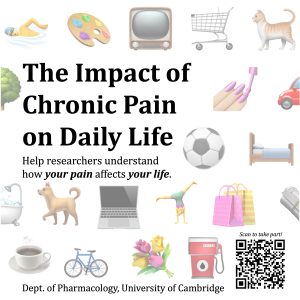
Comparing the Clinical Features of Mechanical and Inflammatory Heel Pain
Comparing the Clinical Features of Mechanical and Inflammatory Heel Pain
What is the study about?
La Trobe University is investigating the clinical differences in heel pain between individuals with an inflammatory condition and individuals without. We hope to learn more about how to differentiate between individuals with heel pain that is caused by a systemic (i.e. whole body) inflammatory condition and individuals with heel pain that is caused by mechanical strain (i.e. from overuse). Participants will also receive a free MRI as part of the study which will be conducted at Direct Radiology in Fairfield, Victoria.
Who can participate?
To be eligible to participate in this study you must be:
- 18 years or older
- Living in Melbourne or surrounding suburbs.
- Diagnosed with a form of spondyloarthritis by a rheumatologist
- Experiencing pain either in the back or bottom of your heel for at least two weeks
- Able to report your average pain in the last seven days is greater than 3/10
What will I have do in this study?
You will have an interview via telephone to screen and confirm your eligibility for the study. Once your eligibility is confirmed and you are happy to participate, you will be required to come to the La Trobe University Health Science Clinic in Bundoora, where you will have an ultrasound taken of your feet and knees, you will also complete a series of questionnaires on a computer. During this initial session you will also be given a referral to Direct Radiology in Fairfield where you will receive your MRI (free of charge) of your affected heel.
Once you have completed your MRI, your participation in the study will be ceased. You will receive a copy of your MRI report via email once it has been completed by the radiology clinic.
If you would like to participate and to find more information about the study, please click the link below.
https://glenwhittaker.wixsite.com/heelpain
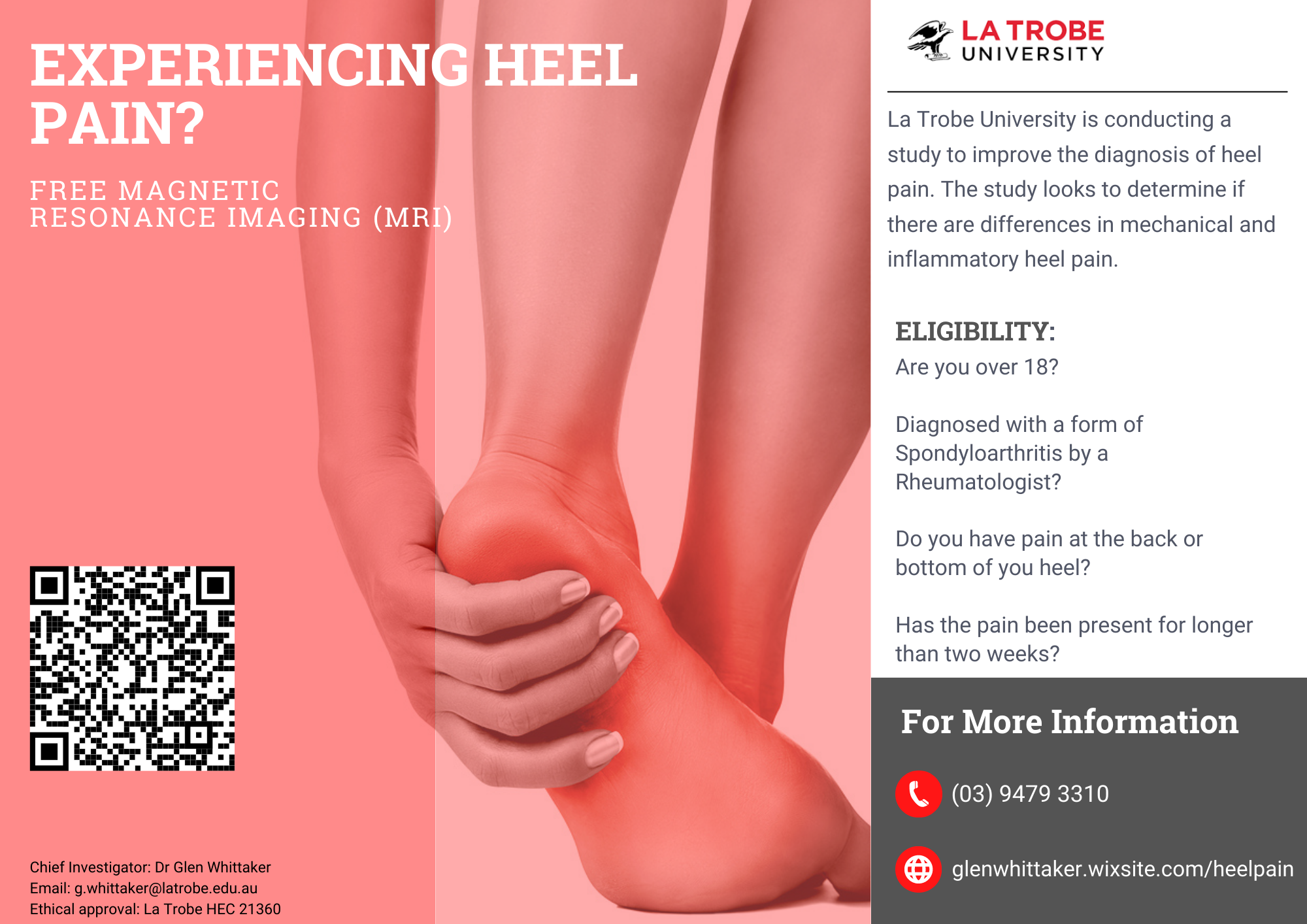
A Trial of Two Psychological Treatments to Help Manage Rheumatoid Arthritis
A Trial of Two Psychological Treatments to Help Manage Rheumatoid Arthritis
What is this study about?
We are conducting a research study which will assess the effectiveness of different online psychological interventions for people with Rheumatoid Arthritis (RA). This research will seek to better understand why some interventions are more effective for specific individuals than others. By developing and evaluating online versions of these interventions we also hope to increase accessibility to these interventions.
Who can take part in the study?
To be eligible for inclusion in this study, you must be an adult (aged over 18) who is currently living in Australia and has a confirmed diagnosis of RA. In addition to this, you must also have regular access to the internet and have functional written and spoken English.
If you are receiving treatment for RA, you must have been on a consistent treatment regime for more than one month to participate in this study. If you are taking anti-depressant medication, you must have been on a stable dose for more than 8 weeks to take part in this study.
You will not be eligible for this study, if you have:
- suicidal intent requiring emergency care
- substance abuse or dependence
- a psychotic illness
- received consistent psychotherapy within the last 6 months
What will the study involve for me?
If you decide to take part in this study, you will firstly complete a short online questionnaire to confirm your eligibility for the study. A clinical psychologist will then conduct a telephone interview with you, in order to confirm your eligibility.
As part of this study, you will be randomly assigned to either one of two different treatments or to a waitlist control condition. Both treatment groups will complete an 8-week online course. During the course you will be guided by a registered clinical psychologist who will offer telephone and email support. If you are allocated to the waitlist control, you will not be given access to either program during the study. However, at the conclusion of the study you will be given access to the program of your choice.
Study Safety
This study has been approved by the University of Sydney (2021/516) Human Research Ethics Committee (HREC).
Contact us:
To learn more about the study and see if you are eligible, please click:https://sydney.au1.qualtrics.com/jfe/form/SV_dnaZ8U87Y9I7TKK.
If you have any further queries, please contact us via email: ra.online@sydney.edu.au
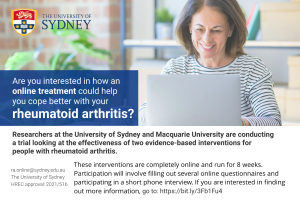
Volunteers needed for potential new therapy for Rheumatoid Arthritis - Servatus Biopharmaceuticals - Maroochydore Queensland
About the study
We are looking for volunteers to help researchers learn more about a potential new therapy for rheumatoid arthritis.
Participation in the study is expected to last up to 16 weeks. This includes:
- 12 week treatment period
- 4 week follow-up period
- 5 visits to the study site at Maroochydore, QLD and 1 phone call
Eligibility requirements
- Are aged 18 – 80 years old
- Have been diagnosed with Rheumatoid arthritis and experiencing joint pain/stiffness.
Unfortunately, participants with a history of any other rheumatic autoimmune disease, other than Sjogren’s syndrome will not be eligible.
Participant benefits
- Receive free study-related medical care
- May gain access to new potential treatments before they are widely available.
- Be reimbursed for out-of-pocket expenses such as travel and parking.
If you would like to participate, please click here to register for the trial.
https://www.surveymonkey.com/r/RheumatoidArthritisTrial
For more information please contact the Servatus team on 0451 211 913.
Have you recently had Knee replacement surgery?
Research project consumer opportunity – pain management after knee replacement surgery
Have you recently had knee replacement surgery?
We are seeking a group of consumers for input on development of a program for psychoeducation about pain management after total knee replacement surgery. This will include providing feedback on scripts for videos and other messages to program participants via an online survey, and potentially one on one interviews via zoom to hear about your experience with pain after knee replacement surgery.
Participants will receive a $40 gift card for an hour of their time.
To find out more and register your interest, please email amy.mcneilage@sydney.edu.au
Understanding attitudes towards physical activity & movement (knee pain) - University of South Australia
About the study
UniSA is seeking people to complete a survey online about their understanding of physical activity and movement.
The study aims to develop new tools to understand knee pain and improve treatments, and people with or without pain are eligible to participate.
The survey takes approximately 30 minutes to complete and includes an implicit association test (IAT).
Eligibility requirements:
- Gender: All
- Aged 18+
- Never diagnosed with Alzheimer’s disease or dementia
- Location: Online
Contact
Click here [https://unisahealth.qualtrics.com/jfe/form/SV_erpqTTAUdTWEEjs] to start the survey
or
email ConceptualFrameworkStudy@gmail.com for more information
This project has been approved by the University of South Australia’s Human Research Ethics Committee Ethics Protocol 204069
Do you have ankle osteoarthritis pain?- A study by the University of Queensland
About the study
The University of Queensland researchers are looking for volunteers with ongoing ankle pain or ankle osteoarthritis to complete an online survey about their experience with their ankle pain. The aim of this study is to understand people’s experiences with their ankle osteoarthritis and what matters they think are important to consider when managing or researching ankle osteoarthritis.
Eligibility requirements:
- Have ankle pain/symptoms on the most days of the last 3 months.
- Are over 18 years of age
Participant benefits:
- Tele-rehabilitation video assessment of your ankle
- Free x-ray of your ankle
- $20 Coles-Myer gift card
Contact
If you would like to participate, please click on the link below:
https://uniofqueensland.syd1.qualtrics.com/jfe/form/SV_6YHBzFhDYbI1cFw
OR for more information, please email Sultan Alanazi on s.alanazi@uq.net.au
This study has been approved by The University of Queensland Human Research Ethics Committee [Approval No. 2019002321]
Do you have Chronic Pain? Research Participant Needed - University of Technology Sydney
About the Study:
We are investigating eating behaviours and how they present in people who experience chronic pain.
If you decide to participate, you will complete an online survey that explores mood, pain and eating behaviours that should take approximately 20 minutes to complete in total.
Eligibility Requirements:
- Have a diagnosis of Chronic Pain by a health professional
- Are over 18 years of age
- Are currently living in Australia
Participant Benefits:
- Participants are eligible to go into the draw to win of three $50 Prezee e-gift cards.
Contact:
If you would like to participate, please click on the link below:
https://utsau.au1.qualtrics.com/jfe/form/SV_5j0RzCkSwaFrg9M
OR for more information, please email Claudia Roche on Claudia.roche@student.uts.edu.au
This study has been approved by The University of Technology Sydney Human Research Ethics Committee [Approval No. ETH22-7179]
OMERACT- Remission in Rheumatoid Arthritis
What is the study about?
We would like to find out more about what independence means to people with rheumatoid arthritis in relation to periods in which disease activity is as good as gone.
Our previous work found that independence was one of the aspects rated as important for patients to consider themselves in a period of their disease activity being as good as gone.
However, we don’t currently have a way of measuring independence. We would like to understand what would be important to include in such a measure to help improve measuring absence of disease activity in a way that is meaningful to patients.
To do this we would like to understand all the different ways patients think about independence in relation to disease activity being as good as gone. We’re also interested in whether ‘Independence’ is the right word.
The study is suitable for people who:
- Are aged 18 or older
- Have rheumatoid arthritis (RA)
- Have experienced at least one period of disease activity being as good as gone since being diagnosed with RA
- Have internet access and access to or willing to download Zoom
- Are willing to attend an online focus group
- Able to speak and read English sufficiently to provide informed consent and take part in a focus group
Study safety
This study has been approved by University of the West of England Health & Applied Sciences Faculty Ethics Committee and the Central Adelaide Local Health Network Human Research Ethics Committee.
Am I eligible?
If you have rheumatoid arthritis and have experienced at least one period of your disease activity being as good as gone, please read the participant information sheet for further information and to leave your contact details: http://go.uwe.ac.uk/Independence
Contact us: If you have any questions please contact Dr Caroline Flurey via email: Caroline2.Flurey@uwe.ac.uk
Volunteers Needed ! Chronic Pain Management by Paramedics- Research Study by Monash University
Have you called an ambulance in the last 5 years for chronic pain?
You may be eligible to participate in research examining the patient experience of chronic pain management by paramedics.
To be eligible:
• Be aged over 18
• Live in Australia
• Have a chronic pain diagnosis
• Called ambulance in last 5 years for chronic pain related complaint
Participation involves:
• One 30-minute interview with a research-student/ paramedic
Benefits:
• Help to improve the management of future chronic pain patients in ambulance settings
FOR MORE INFORMATION:
https://monash.az1.qualtrics.com/jfe/form/SV_3PKcNEMsGLpiQjs
Alternatively, contact Lucinda Marinelli via email
lmar0050@ student.monash.edu
Gait REtraining intervention for people with knee osteoArthritis Trial (The GREAT Study)
Gait REtraining intervention for people with knee osteoArthritis Trial (The GREAT Study)
Do you have knee osteoarthritis pain?
You are invited to take part in a research study evaluating the effects of three novel interventions, which are walking (gait) strategies for people with knee osteoarthritis. These walking strategies may have the ability to reduce the loading forces and pain in the knee joint, however we do not know which one is most effective.
What will the study involve for me?
This study is a randomised controlled trial. This means you will be randomly assigned to one of three gait retraining groups. If you are interested in this study you will be screened to determine eligibility, then asked to visit The University of Sydney Camperdown campus for a total of 7-9 visits. This will include:
ü Detailed evaluations of your walking in our state-of-the-art biomechanics laboratory
ü Education about knee osteoarthritis
ü Physiotherapy or podiatry supervised gait retraining sessions
In addition, we ask you to practice your walking strategy for 30 minutes per day and complete three online questionnaires during the study period.
Who can take part in the study?
Adults with knee osteoarthritis or knee pain, aged 45 years or older who can walk unaided for 30 minutes.
Am I eligible?
If you are interested, please read our participant information statement and complete the eligibility screening survey here.
Study safety
This project has been approved by The University of Sydney Human Research Ethics Committee (2019/639) and Clinical Trials Governance.
Contact us
thegreat.study@sydney.edu.au +61 2 8627 0030
Suffer from knee Osteoarthritis ? The BOOST trial- Neuroscience Research Australia- Sydney
Do you suffer from knee Osteoarthritis ?
You could be one of the first people in Australia to volunteer for a study that combines non-invasive brain stimulation and exercise therapy.
We are looking for volunteers who are:
- over 60 years old
- have knee osteoarthritis
- reside in and around South East Sydney
Led by scientists at Neuroscience Research Australia (NeuRA), the BOOST trial will provide explore the use of brain stimulation and exercise therapy in people with knee osteoarthritis. We’d like to invite any volunteers who fit the above criteria to take part in this exciting trial.
As a thank you, participants will receive 12 one-to-one physiotherapy treatments regardless of which study group they are allocated to. Each session will include 15 minutes of brain stimulation plus 30 minutes of one-to-one exercise by a physiotherapist. This intervention is completely safe, painless and non-invasive, designed to target the part of the brain involved in pain processing and motor function to enhance the effects of exercise therapy.
To find out more about the trial, contact Wei-Ju Chang at w.chang@neura.edu.au or sign up through this link https://www.neura.edu.au/project/boost/
Have you or cared for someone who has received a knee or Hip replacement during the last 12 months?- A survey fromMonash University
hort-stay joint replacement programs
Have you received hip or knee replacement surgery in Australia within the last 12 months? Or are you a carer for someone who has received hip or knee replacement surgery in Australia within the last 12 months?
Monash University researchers are seeking your help with new research into short-stay joint replacement programs (also called ‘fast track’ or ‘enhanced recovery’ programs). This research is funded by a research grant from the HCF Research Foundation.
We are conducting a short online survey (10-15 minutes) to understand your views about short-stay joint replacement programs and help us understand any potential challenges that patients may face. The survey is anonymous.
This research has been approved by the Monash University Human Research Ethics Committee (ID 35300).
Please click on the link below to complete the survey:
https://monash.az1.qualtrics.com/jfe/form/SV_0SvXPAtmE3LXz7MQualtrics survey link )
For more information, please contact Professor Ilana Ackerman (ilana.ackerman@monash.edu) or Dr Danielle Berkovic (danielle.berkovic@monash.edu) at the School of Public Health and Preventive Medicine
A Survey for Health Professionals & Hospital Administrators caring for Hip or Knee replacement patients- Monash University
Are you an Hospital Administrator, orthopaedic surgeon, anaesthetist, general practitioner, nurse or physiotherapist who currently provides care to patients undergoing hip or knee replacement surgery in Australia?
Monash University researchers are seeking your help with new research into short-stay joint replacement programs (also called ‘fast track’ or ‘enhanced recovery’ programs). This research is funded by a research grant from the HCF Research Foundation.
We are conducting a short online survey (10-15 minutes) to understand health professionals’ views about current practices, the perceived feasibility and acceptability of short-stay joint replacement programs, and barriers and enablers to the implementation and sustainability of these programs in Australia. Health professionals working in public or private settings, including community-based settings, are invited to participate.
This research has been approved by the Monash University Human Research Ethics Committee (ID 35300).
Please click on the link below to complete the survey:
https://monash.az1.qualtrics.com/jfe/form/SV_0SvXPAtmE3LXz7M
For more information, please contact Professor Ilana Ackerman (ilana.ackerman@monash.edu) or Dr Danielle Berkovic (danielle.berkovic@monash.edu) at the School of Public Health and Preventive Medicine
Low back pain study- University of Queensland
EVER HAD LOW BACK PAIN?
We want to hear from you!
If you are over 18 years old and have or ever had low back pain, you may be able participate!
The purpose of this research is to gain insights into how to improve uncertainty management in low back pain care
For more information, please contact: n.cordeirodacosta@uq.edu.au
ARE YOU A CLINICIAN WHO WORKS WITH PEOPLE WITH LOW BACK PAIN?
We want to hear from you!
We want to investigate your experiences of navigating uncertainty with patients.
The aim is to gain insights into how clinicians communicate with patients about uncertainty.
Please contact: n.cordeirodacosta@uq.edu.au
This study is approved by the Human Research Ethics Committee from The University of Queensland, ethics ID: 001723.
SCUlpTOR Study - Stem cell injections for knee osteoarthritis- University of Sydney & University of Tasmania
What is this study about?
The SCUlpTOR trial is a research study aiming to see if stem cells injected into the knees of people with knee osteoarthritis (OA) can improve their symptoms compared with placebo. The medical opinion about stem cell therapy for treating osteoarthritis is mixed due to limited research evidence and considerable costs. So our aim is to find out whether or not stem cell injections into the knee improve symptoms and slow disease progression in people with mild to moderate knee OA. The stem cells we use originally came from a healthy donor/master cell bank and are made following standard manufacturing process to make sure they are safe and standardised.
If the study is suitable for you, you will have a 50% chance of being allocated to either group and receive:
Active group: three knee intra-articular injections of allogeneic MSCs (stem cells) performed at baseline, week 3 and 52.
Placebo group: three knee intra-articular injections of saline performed at baseline, week 3 and 52.
As a participant, you will be asked to attend seven study visits and complete online surveys regularly over 24 months.
The study is suitable for people who:
• Are aged 40 years or older and living in Australia (and have a Medicare number)
• Have knee OA and moderate pain assessed by the visual analogue pain intensity scale from 0 (no pain) to 100 (worst pain possible)
• Have internet access and an active email account
• Are willing to stop or maintain knee OA treatments (e.g. supplements, physiotherapy) for the duration of the study
• Are willing to stop or minimise the use of anti-inflammatory drugs (e.g. Aspirin, Nurofen, Ibuprofen, Mobic, Voltaren, etc.) and other analgesics (e.g. opioids), except for paracetamol (only for rescue pain relief) for the duration of the study. This includes stopping all pain medications for one week before each study assessment.
• Able to speak and read English sufficiently to understand study procedures, complete questionnaires and provide informed consent.
• Are willing and able to travel for the study required physical visits.
Study Safety
This study has been approved by the University of Sydney (2020/119) and the University of Tasmania’s (21868) Human Research Ethics Committee (HREC).
Am I eligible?
If you have knee pain due to osteoarthritis and live in Sydney or Hobart, please complete the online screening survey available at www.tinyurl.com/sculptor-trial to assess your eligibility.
Contact us:
If you have any further queries, please contact the SCUlptor team via email: sculptor.trial@sydney.edu.au
Monash University - Falls risk and falls prevention among people with osteoarthritis
Are you a person aged 50 years or older who has been diagnosed with hip or knee osteoarthritis? Do you know someone who is aged 50 years or older who has been diagnosed with hip or knee osteoarthritis?
Falls are a leading cause of injury and hospitalisation among older people. While effective falls prevention programs do exist, falls prevention has not traditionally been a common component of osteoarthritis care.
Monash University researchers are seeking your help with new research into osteoarthritis and falls prevention. This research is funded by Arthritis Australia.
The study is conducting telephone interviews (30 – 45 minutes) to better understand the falls risk and falls prevention beliefs and experiences of people with hip or knee osteoarthritis.
To express an interest in participating in this research, please contact Chief Investigator Dr Darshini Ayton, School of Public Health and Preventive Medicine:
Phone: 03 9903 1660
Email: darshini.ayton@monash.edu.
IWK Health Centre - Seeking parents of children with JIA worldwide for an online research study
The IWK Health Centre wants to learn about your child’s arthritis pain and treatment experiences, from YOUR perspective.
Researchers are seeking parents of children with Juvenile Idiopathic Arthritis (between the ages of 0-17) to participate in a brief online survey led by researchers at the Centre for Paediatric Pain Research at the IWK Health Centre in Canada. The online survey will take about 20 minutes to complete and participants can enter a draw to win 1 of 5 $100 CAD online gift cards.
Participate at: bit.ly/JIASurvey
For more information, or to contact us, visit: ItDoesntHaveToHurt.ca/campaigns/jiasurvey
Recruitment will occur from October 25th 2018 – November 30th 2018
INC Research/inVentiv Health Australia - A Clinical Study for Non-Radiographic Axial Spondyloarthritis (nr-ax SpA)
Nr-ax SpA is a type of arthritis usually diagnosed in early adulthood that involves pain and stiffness in the lower back, hip joints, and buttocks during the waking hours and after periods of inactivity. Treatments may decrease pain and lessen symptoms.
If your nr-ax SpA symptoms persist despite current treatments, you may want to consider participating in a clinical research study with an investigational study medication.
You may be eligible to participate in this clinical study if you:
- Are 18 to 49 years of age;
- Currently take an anti-inflammatory drug for nr-ax SpA and continue to have back pain;
- Have had nr-ax SpA symptoms for at least 3 months or less than 5 years;
- Are willing to follow a study treatment plan, routinely scheduled study visits, and other study tests and procedures over an 21-month period.
Qualified participants will receive study-related medical care and investigational study medication at no cost while enrolled in the study.
Three study sites in Australia are currently looking for people to participate in this clinical study. For more information about this study, please contact:
Maroochydore, Qld – Rheumatology Research Unit, Coast Joint Care
Ms. Dale Shergold | Email: dale@coastjointcare.com | Ph: 07 5443 1033
Newcastle, NSW – Genesis Research Services
Dominic Bailey | Email: dom@genesisresearchservices.com | Ph: 02 4985 1860
Perth, WA – R.K Will Pty Ltd, Colin Bayliss Teaching and Research Unit
Julie Uhlmann or Agatha Khow | Email: Juhlmann@bdaus.com.au | Ph: 08 9472 1904 (option 3)
University of Tasmania - Do you use prescription-only opioid medications to manage chronic pain?
Researchers at the University of Tasmania are conducting a brief online survey about the experiences of people who use prescription-only opioid medications to manage chronic non-cancer pain. Participants will be asked about medication use, pain, cognitive functioning, and physical and mental health.
Survey requirements:
- male or female participants aged 18 – 65 years
- currently using prescription opioids as treatment for chronic pain (lasting three months or more) that is not related to cancer.
Participants can enter the draw to win one of five $50 vouchers.
Details:
Access the survey click here
For more information contact Jane Akhurst: jakhurst@utas.edu.au
CMAX Study - Do you have Osteoarthritis of the hip or knee?
CMAX is an independent, clinical trial facility located at 18a North Terrace in Adelaide, that carries out research on a variety of investigational medicines for the pharmaceutical industry.
CMAX is conducting a study of an investigational medication for the treatment of pain associated with osteoarthritis of the hip or knee.
This trial has been approved by the Bellberry Human Research Ethics Committee.
We are seeking volunteers aged over 18 years that have osteoarthritis of the hip or knee. The trial involves 12 visits to the CMAX unit over a 21 month period.
For more information about the CMAX study click here.
If you are interested in participating, please phone CMAX on 1800 150 433.
Queensland University of Technology (QUT) trial - Testing of a program to reduce chronic pain and associated health outcomes
For adults with chronic pain in Brisbane: Participants needed for QUT trial of a 3-week computer-based program.
This project aims to investigate whether a new psychological program, completed on a computer once a week for 3 consecutive weeks, can reduce chronic pain and associated health outcomes. Participation will include completing 3 short computer-based sessions (10-20 min each, over 3 weeks at one of the QUT Brisbane campuses) and some online surveys.
To find out more and enter the initial survey click here.
For any questions, please email julie.vermeir@connect.qut.edu.au.
Regulating Autologous Stem Cell Therapies in Australia
The University of Sydney is looking for participants for an Australian Research Council-funded research project exploring the regulation of autologous adult stem cell (ASC) therapies in Australia.
The study seeks to explore the attitudes of major stakeholders regarding patient access to innovative ASC therapies. Despite limited evidence of their efficacy and safety, ASCs (stem cells derived from the patient’s own body) are increasingly being offered for the treatment of a wide range of conditions, including chronic diseases, asthma, dementia, motor neurone disease or arthritis.
We are looking for health professionals, patient representatives and patients, their carers and family members to take part in a workshop (Nov 21 in Sydney and Nov 28 in Melbourne) and/or a short interview exploring their views on ASC therapies in Australia. Workshop participants will be offered $50 reimbursement for travel to and from the workshop and a $50 supermarket voucher. The study is confidential and anonymity is guaranteed to participants.
If you would like to participate, please contact Dr Tereza Hendl at tereza.hendl@sydney.edu.au.
More information about the study can be found at: http://sydney.edu.au/law/health/stemcells/index.shtml
Testing the safety, tolerability and efficacy of a new medication called AKP-11 administered to participants with arthritis
You are invited to take part in this research project if you have been diagnosed with a form of arthritis and are aged between 18 years and 65 years. This research project is testing the safety, tolerability and efficacy (how well the drug works in alleviating pain) of a new medication called AKP-11, which will be administered to participants with arthritis.
AKP-11 is an experimental topical, anti-inflammatory drug for the treatment of arthritis, including gout. This drug is believed to curb a variety of the pathological events associated with arthritis via a multi-modal mechanism of action. The study seeks to determine the safety, tolerability, and efficacy of topical doses of AKP-11 compared to matching placebo in participants with rheumatoid arthritis or gout.
For further information visit www.anzctr.org.au/ and enter the identifier ACTRN 12616000922471 in the search box and click on the link provided.
Participate in an Australian-wide study on biologic use in pregnancy
- Do you have an inflammatory arthritis such as rheumatoid arthritis, psoriatic arthritis, ankylosing spondylitis?
- Are you a woman aged over 18?
- Are you on or have you been on an injection treatment for your arthritis?
- Have you had a pregnancy or are you currently pregnant?
Phone: 0452 423 970
Potential Treatment for Symptoms of Osteoarthritis in the Knee
A randomised clinical trial of a treatment for mild to moderate osteoarthritis of the knee.
The study is looking for participants aged between 40 and 80 years of age, with mild OA in either or both knees to test a treatment for 8 weeks.
Trial volunteers would need to:
- Make 3 visits to the clinic – week 1, week 4 and week 8
- Have blood tests at a QML collection centre – week 1, week 4 and week 8
- Take the medication daily for 8 weeks
Clinic locations are in Brisbane and Redcliffe and Sunshine Coast
For further information please contact:
Phone: (07) 3162 0909
Email: clinic@ihgtrials.com.au
Fast Vs slow weight loss - which is better? The TEMPO Diet Trial
Losing excess weight is scientifically proven to help reduce and prevent joint pain. One way to get support for weight loss is to participate in a clinical weight loss trial, where you get the support of a research team and others in the trial.
For many years health professionals have recommended ‘slow and steady’ weight losses of approximately 0.1 to 1 kilo per week. In recent years however, an increasing number of health professionals are prescribing meal replacement diets called very low calorie diets (VLCDs) because they can induce relatively fast weight losses of approximately 0.5 to 2 kilos per week, which some people find motivating, and because some people report not feeling hungry while following a VLCD.
While VLCDs are known to be safe and effective in the short-term (for up to one year), the long-term consequences are unknown. This study will demonstrate whether or not there is any difference between the effects of weight loss via VLCD or conventional diet on metabolic health, body fat content and distribution, muscle mass and strength, and bone density in post-menopausal women for 3 years after commencement of the diet.
- To watch Associate Professor Amanda Salis talking about the TEMPO Diet Trial click here.
- To watch Associate Professor Amanda Salis talking about A Day in the Life on a VLCD, click here.
- To read the Information for Participants click here (PDF file).
Recruitment for the TEMPO Diet Trial is currently underway. If you are interested in participating in this trial and are female, living in the Sydney metropolitan area, aged 45-65, postmenopausal for 5 years or more, are non-diabetic and you have a body mass index (BMI*) of 30 to 40 kg/m2, you may be eligible for this study.
*To calculate your BMI, divide your weight in kilograms by the square of your height in meters, or use this web-based BMI calculator: http://www.heartfoundation.org.au/healthy-eating/Pages/bmi-calculator.aspx.
For more information contact The TEMPO Team (Ms Michelle Hsu, Dr Radhika Seimon, Ms Alice Gibson and Associate Professor Amanda Salis) on tempo.diet@sydney.edu.au
Sign up to Arthritis Insights
Regular updates, news and research findings delivered to your inbox: